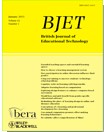- 简介: e-Assessment cannot benefit learners, and so education, unless it supports them in doing something differently in future. What, however, are learners trying to do better? This paper adopts a perspective in which learners simultaneously self-regulate multiple variables that are relevant to learning, and develops a theoretical argument that a key issue is the ambiguity of feedback events (such as a failed task or a poor mark) as to which variable should be adjusted. A common tacit assumption is that the relevant loop is about technical expertise, but in reality, students must and do also adjust effort, learning methods and course choices. Two methods for helping learners by resolving this ambiguity are discussed: telling learners directly which interpretation is relevant, and structuring learning activities to focus on one variable. Which loops are most important to learners generally shifts in the transition from school to university, implying that the role of feedback also changes. e-Assessment needs a major rethink to address these needs, and to understand why feedback is so often apparently ignored by students. Conversely, attending to all these loops would be to open new dialogues with learners.
- 分类: 暂无分类
-
标签:
- 学习内容
- What are learners actually regulating when
- 超链接

